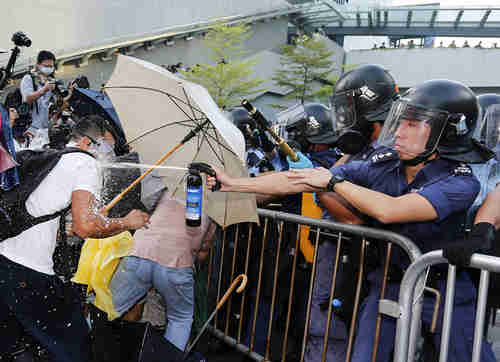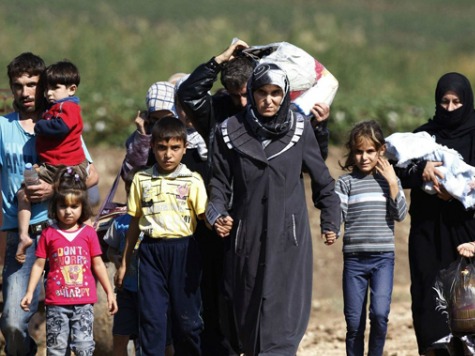
This morning’s key headlines from GenerationalDynamics.com
- Hong Kong police back off as demonstrations continue
- Kobani crisis causes Turkey to reverse policy on Syria
Hong Kong police back off as demonstrations continue

Riot police use pepper spray in Hong Kong on Sunday (Slate)
The massive protests in Hong Kong have caught the world’s attention,and the world is waiting breathlessly to see how long China’sgovernment in Beijing is going to put up with being humiliated by theprotests.
Hong Kong has already been forced to cancel a big, glorious fireworkscelebration on Wednesday, October 1, China’s National Day, and the65th anniversary of China’s communist revolution. Instead, theprotests will be bigger than ever on Wednesday and Thursday, sincethose are two public holidays.
For Beijing, the hopeful outcome is that the protests will justdie off of their own accord. That’s probably why the HK police,who fired teargas and rubber bullets at protesters on Sundayevening, have backed off on Monday and allowed the proteststo continue. The hopeful scenario is that the protesters willtire of protesting, and just go home.
Beijing’s nightmare scenario is that the protests will grow, willcontinue to paralyze Hong Kong, and will continue to humiliateBeijing.
But the humiliation could be a lot worse if the rumors are true thatChina is considering use of the People’s Liberation Army (PLA) tobreak up the protests. The 1989 Tiananmen Square massacre shocked theworld, and China has spent the last 25 years doing everything it canto try to get everyone to forget it ever happened, going so far as tomake it a criminal offense for a Chinese citizen on the mainland toeven talk about it. A new 2015 “Hong Kong massacre,” in the world ofTwitter and Facebook, would make both massacres world wide news again,completely reversing Xi Jinping’s strategy of presenting a morepositive Chinese face.
Nonetheless, nobody serious believes that Beijing is going to grant toHong Kong the democratic freedoms that were promised in 1997, whenBritain turned HK over to China. China has no pleasant choices inthis situation, and most of the world really do not expect thedemonstrations to end, except in new violence. Bloomberg and Global Times (Beijing)
Kobani crisis causes Turkey to reverse policy on Syria
Ever since the Syrian conflict broke out in 2011, Syrian refugeeshave been pouring across the border into Turkey. Despite international pressure,Turkey refused to consider any military action in Syria, such asproviding a refugee buffer zone within Syria, and more recentlyrefused to participate in the American-led war against the IslamicState / of Iraq and Syria (IS or ISIS).
But now the crisis in Kobani, Syria, on the border with Turkey, ispresenting an existential threat to Turkey, and Turkish officials are talking about both a buffer zone and joining the anti-ISIScoalition.
There have been two major reasons why Turkey has eschewed anymilitary intervention in Syria since 2011:
- Turkish officials, like American officials, were in a state of denial, expecting Syria’s president Bashar al-Assad to be forced out of office within weeks, or at most a few months. This fantasy persisted even when the civil war morphed into a proxy war, with Russia supplying heavy weapons to al-Assad, and al-Assad’s actions becoming increasingly genocidal.
- Turkey feared that any military intervention against al-Assad would end up helping the Syrian Kurds. Turkey had recently fought its own civil war with the Kurds in Turkey, and there was no desire to help the Kurds in Syria.
But the crisis in Kobani, in Syria on the border with Turkey,has been so bad that Turkey is now forced to reassess itsdecisions.
Kobani has been a Kurdish stronghold in Syria. Islamic State fightershave been advancing on Kobani in recent weeks, despite thefact that coalition bombers tried to stop them. It’s now expectedthat Kobani will fall to ISIS within the next couple of days.
The effect on Turkey has been nothing short of explosive. Duringthe last two weeks, more than 160,000 Kurdish refugees fromSyria have poured across the border into Turkey.
Back in 2011, when refugees started crossing into Turkey, Turkishofficials estimated that they would be able to handle about 100,000refugees, and after that there would be major problems. As oflast month, over 1.2 million Syrian refugees have crossed into Turkey,and now 160,000 more refugees have joined them in the last few days.
In 2011, when there were only tens of thousands of refugees, they werekept in refugee camps near the border. But now these 1.5 millionrefugees have spread across Turkey, and are populating many cities andvillages.
The effects have been mixed. Most of the refugees speak only Arabic,so there’s a language problem with locals who speak only Turkish. Insome villages they’re helped and supported, but in other villagesthey’re threatened, or even forced into slavery or human trafficking.
The Kobani crisis has been be a major shock to Turkish officials, whonow realize that they have to take some military steps whether theylike it or not. Turkey has already announced that it’s reevaluatingits decision to join the anti-ISIS coalition, and Turkey’s foreignminister Mevlüt Çavusoglu said on Monday that “A safe zone insideSyria is essential to make life easier for the Syrian refugees.”Turkish tanks have already taken up positions facing Syria. Spiegel and Journal of Turkish Weekly and Daily Sabah (Ankara)
KEYS: Generational Dynamics, Hong Kong, China, Tiananmen Square,Syria, Kobani, Turkey, Arabic, Turkish, Kurds, Mevlüt Çavusoglu,Islamic State / of Iraq and Syria/Sham/the Levant, IS, ISIS, ISIL,
Permanent web link to this article
Receive daily World View columns by e-mail

COMMENTS
Please let us know if you're having issues with commenting.